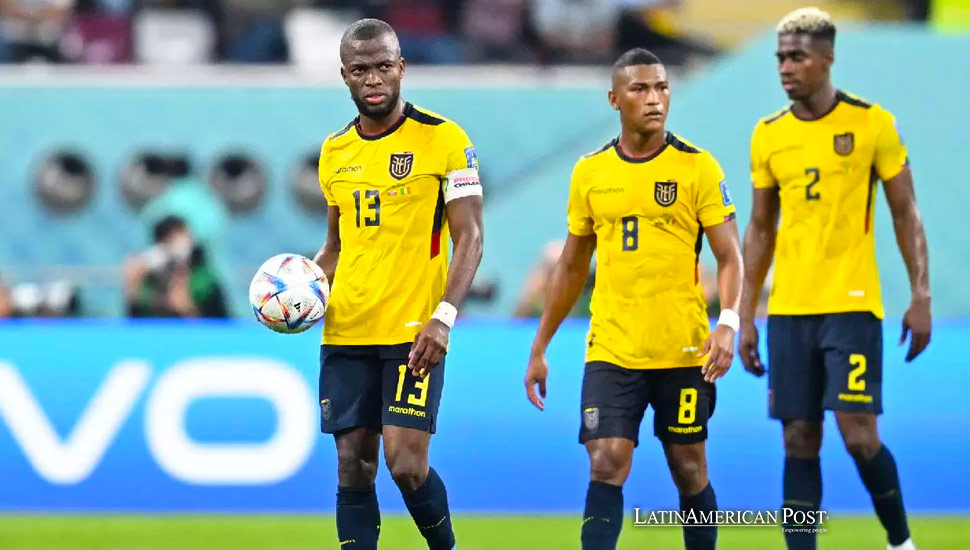Ecuadorian Soccer Faces Image Crisis After Night Out Scandal

Following a controversial night out in New York, Ecuador’s soccer federation grapples with maintaining discipline while preserving the national team’s image as they prepare for the upcoming Copa América.
In the world of international sports, where the spotlight never dims, athletes’ behavior off the field can often spark as much conversation as their performances on it. This was certainly the case in March when three players from Ecuador’s national soccer team—Robert Arboleda, Gonzalo Plata, and Kendry Páez—were seen at a New York nightclub engaging in activities that stirred significant public and media backlash.
Ecuadorian Soccer Federation Under Scrutiny
The incident occurred following Ecuador’s 2-0 friendly match victory over Guatemala. Images that surfaced online showed Arboleda, a seasoned defender, and Plata, an attacking player, along with 16-year-old midfielder Páez, at a club where money was ostentatiously thrown at scantily clad dancers. This event swiftly escalated into a full-blown scandal, challenging the Ecuadorian Soccer Federation (FEF) to address the situation and enforce discipline.
Antonio Valencia, a revered figure in Ecuadorian soccer and a former Manchester United player, commented on the controversy during an appearance on the “Federación Postera.” Known affectionately as ‘Toño’ Valencia, the retired soccer player expressed a somewhat lenient view. “The boys had a day off; they are young. We need to care for them a bit more,” Valencia said. He highlighted the necessity for the federation to ensure adequate security and guidance for the players, emphasizing the importance of protecting the country’s reputation.
However, the FEF’s response suggested a stricter stance. In a statement released late Monday, the federation declared, “Images have been circulated showing actions contrary to the values and principles we defend and promote as an institution. These will be subject to analysis for future call-ups.” This statement reflects a growing trend within Latin American soccer federations to hold players accountable for their conduct, particularly when it can negatively affect the team’s public image and internal morale.
The repercussions for Arboleda and Plata, who have prior incidents of similar nature, could be severe, with local media speculating that this might affect their future selections for the national team. The incident served as a cautionary tale for Páez, whose youthful indiscretion at 16 has drawn particular attention.
This situation is not unique to Ecuador. Across Latin America, national teams often struggle to manage young talents who suddenly find themselves thrust into the limelight with rich contracts in hand and the world at their feet. From Argentina to Mexico, stories of young players caught in compromising situations have forced soccer federations to reconsider how they mentor and manage their athletes.
The broader implications of such incidents are significant, particularly as Ecuador prepares to compete in the Copa América hosted by the United States in June. The federation must balance the need to discipline players while preparing them for one of the biggest stages in international soccer. The incident has also sparked a conversation about the role of a national federation in providing support systems that include not just training and tactical guidance but also life coaching and personal management.
Shaping the Future: FEF’s Response Determines Ecuador’s Soccer Landscape
As the FEF ponders the lessons from this controversy, the need for a robust framework to handle such issues becomes apparent. Implementing structured mentorship programs, enforcing behavioral clauses in player contracts, and establishing clear consequences for misconduct are steps that could mitigate future controversies.
Moreover, the incident highlights the need for ongoing dialogue about young athletes’ pressures and temptations. The federation’s ability to navigate this delicate balancing act—upholding discipline while supporting player development holistically—will be crucial as they aim to not only succeed in the Copa América but also cultivate a team that embodies the values and aspirations of Ecuadorian soccer.
Also read: Legal Battles Rage Following Argentinian Soccer Star Emiliano Sala’s Tragic Death
While the night out in New York might seem like a fleeting scandal, it is a pivotal learning opportunity for the Ecuadorian Soccer Federation. How they respond and adapt to these challenges will resonate far beyond the immediate repercussions for the players involved. The federation’s actions could set the tone for a new era of professionalism and accountability in Ecuadorian soccer, which would be crucial as the nation eyes success on the international stage.





